Related Research Articles
The Roman Curia comprises the administrative institutions of the Holy See and the central body through which the affairs of the Catholic Church are conducted. It acts in the pope's name and with his authority for the good and for the service of the particular churches and provides the central organization for the church to advance its objectives.
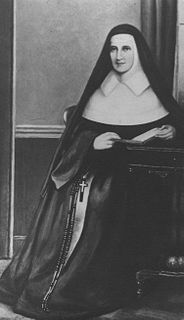
The Religious Sisters of Mercy are members of a religious institute of Catholic women founded in 1831 in Dublin, Ireland, by Catherine McAuley. As of 2019, the institute has about 6200 sisters worldwide, organized into a number of independent congregations. They also started many education and health care facilities around the world.
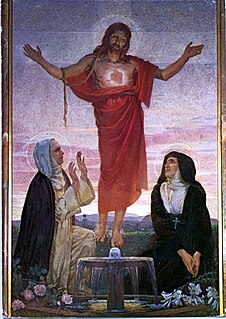
The devotion to the Sacred Heart is one of the most widely practised and well-known Catholic devotions, wherein the heart of Jesus is viewed as a symbol of "God's boundless and passionate love for mankind". This devotion is predominantly used in the Catholic Church, followed by high-church Anglicans, Lutherans and some Western Rite Orthodox. In the Latin Church, the liturgical Solemnity of the Most Sacred Heart of Jesus is celebrated the first Friday after the Solemnity of the Most Holy Body and Blood of Christ, or 19 days after Pentecost Sunday. The 12 promises of the Most Sacred Heart of Jesus are also extremely popular.

Edmund Casimir Szoka was an American prelate of the Roman Catholic Church. He was President Emeritus of the Pontifical Commission for Vatican City State and President Emeritus of the Governorate of Vatican City State, having previously served as Bishop of Gaylord from 1971 to 1981 and Archbishop of Detroit from 1981 to 1990. Szoka was elevated to the cardinalate in 1988.

In the Catholic Church, a religious order is a community of consecrated life with members that profess solemn vows. According to the 1983 Code of Canon Law, they are classed as a type of religious institute.
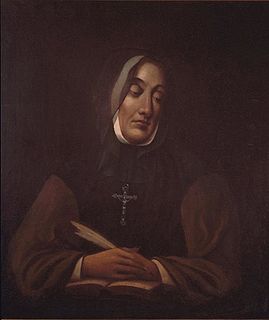
The Sisters of Charity of Montreal, formerly called The Sisters of Charity of the Hôpital Général of Montreal and more commonly known as the Grey Nuns of Montreal, is a Canadian religious institute of Roman Catholic religious sisters, founded in 1737 by Saint Marguerite d'Youville, a young widow.
The Pontifical Council for Interreligious Dialogue (PCID) is a dicastery of the Roman Curia, erected by Pope Paul VI on 19 May 1964 as the Secretariat for Non-Christians, and renamed by Pope John Paul II on 28 June 1988.
The Congregation for Institutes of Consecrated Life and Societies of Apostolic Life, (CICLSAL) is the congregation of the Roman Curia with competency over everything which concerns Institutes of Consecrated Life and Societies of Apostolic Life, regarding their government, discipline, studies, goods, rights, and privileges.
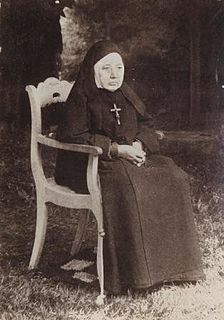
The Felician Sisters, officially known as the Congregation of Sisters of St. Felix of Cantalice Third Order Regular of St. Francis of Assisi (CSSF), is a religious institute of pontifical right whose members profess public vows of chastity, poverty, and obedience and follow the evangelical way of life in common. This active-contemplative religious institute was founded in Warsaw, Poland, in 1855, by Sophia Truszkowska, and named for a shrine of St. Felix, a 16th-century Capuchin saint especially devoted to children.
An institute of consecrated life is an association of faithful in the Catholic Church erected by canon law whose members profess the evangelical counsels of chastity, poverty, and obedience by vows or other sacred bonds. They are defined in the 1983 Code of Canon Law under canons 573–730.
The Missionaries of Our Lady of La Salette are a religious congregation of priests and brothers in the Latin Church, one of the 23 sui iuris churches which make up the Catholic Church which is led by the Bishop of Rome. They are named after the apparition of Our Lady of La Salette in France. There is also a parallel religious community of sisters called the Missionary Sisters of Our Lady of La Salette. A lay fraternal group of associates also works in cooperation with the vowed religious. The Missionaries are dedicated to making known the message of Our Lady of La Salette, a call to healing of inner brokenness and personal reconciliation with God, especially as found in the first three commandments. The missionaries are popularly known as "the La Salettes."
The Third Order of Saint Francis, is a third order in the Franciscan order. The preaching of Francis of Assisi, as well as his example, exercised such an attraction on people that many married men and women wanted to join the First Order (friars) or the Second Order (nuns), but this being incompatible with their state of life, Francis found a middle way and in 1221 gave them a rule according to the Franciscan charism. Those following this rule became members of the Franciscan Third Order, sometimes called tertiaries. It includes religious congregations of men and women, known as Third Order Regulars; and fraternities of men and women, Third Order Seculars. The latter do not wear a religious habit, take vows, or live in community. However, they do gather together in community on a regular basis. "They make profession to live out the Gospel life and commit themselves to that living out the Gospel according to the example of Francis."
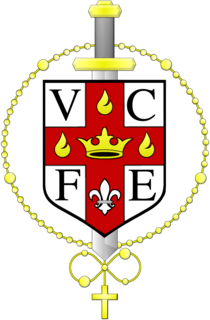
The Institute of the Incarnate Word (IVE) is a Roman Catholic religious institute founded in Argentina by Fr. Carlos Miguel Buela on March 25, 1984. The institute is a Clerical Institute of Consecrated Life of Diocesan Right which includes both priests and religious brothers of either apostolic or contemplative life. The institute is the male branch of the Religious Family of the Incarnate Word: a union of religious institutes founded by Fr. Buela. The other two branches are the female religious community known as the Servants of the Lord and the Virgin of Matará (SSVM) and the Secular Third Order.
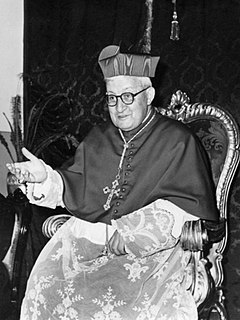
Arcadio María Larraona Saralegui, C.M.F. was a Spanish Cardinal of the Catholic Church. He served as Prefect of the Sacred Congregation of Rites from 1962 to 1968, and was elevated to the cardinalate in 1959.
A pontifical commission is a committee of Catholic experts convened by the Pope for a specific purpose. The following is a list of commissions, the dates they began and the pope who established.
- Pontifical Commission for the Cultural Heritage of the Church, 1988 by Pope John Paul II.
- Pontifical Commission for Sacred Archaeology, 6 January 1852 by Pope Pius IX.
- Pontifical Biblical Commission, 30 October 1902 by Pope Leo XIII.
- International Theological Commission, 1969
- Pontifical Commission for Latin America, 19 April 1958 by Pope Pius XII.
- Pontifical Commission for Religious Relations with the Jews, established 22 October 1974.
- Pontifical Commission for Reference on the Institute for Works of Religion, 24 June 2013 by Pope Francis.
- Pontifical Commission for Reference on the Organisation of the Economic-Administrative Structure of the Holy See, 18 July 2013.
- Pontifical Commission for the Protection of Minors, 22 March 2014.
- Pontifical Commission for Vatican City State, which is an institute of the Vatican City State and not considered as part of the Roman Curia, 1939 by Pius XII.

Gerhard Ludwig Müller is a German cardinal of the Catholic Church. He served as the Prefect of the Congregation for the Doctrine of the Faith (CDF) from his appointment by Pope Benedict XVI in 2012 until 2017. He was elevated to the rank of cardinal in 2014.

Agnes Mary Mansour was an American Roman Catholic nun who was given a choice from the Vatican in 1983 to end her religious vows or to resign from her position as the director of the Michigan Department of Social Services which required her to support and allocate public funding for abortions. The controversy involved her belief that abortion was tragic but should be legal, despite her vows as a religious and the teachings of the Catholic Church.
The Daughters of Our Lady of Mercy is a religious institute of pontifical right whose members profess public vows of chastity, poverty, and obedience and follow the evangelical way of life in common.
The Daughters of the Sacred Heart of Jesus is a religious institute of pontifical right whose members profess public vows of chastity, poverty, and obedience and follow the evangelical way of life in common.
The Sisters of Mercy of Verona is a religious institute of pontifical right whose members profess public vows of chastity, poverty, and obedience and follow the evangelical way of life in common.
References
- ↑ "Our History", Religious Sisters of Mercy of Alma, Michigan
- ↑ "Professing vows: At 40th anniversary, Alma Religious Sisters of Mercy expanding foundation", Diocese of Knoxville
- ↑ Sacred Heart Mercy Health Care Center
- ↑ Salai, Sean. "A Feminist Voice on the Theological Commission", America, October 29, 2014